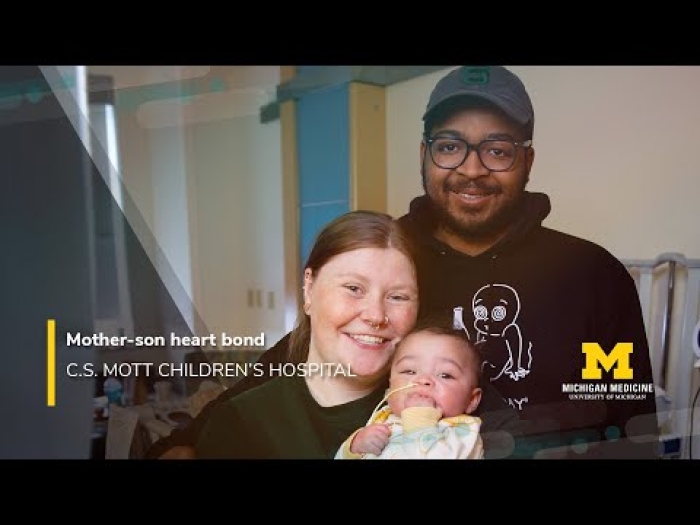Their special connection supports Robin through her craniofacial procedures
12:39 PM
Author |
When Robin Repko was born with a craniofacial defect, as well as a congenital heart defect, the family’s local community became their support group.
Six years later, the family discovered extra support in the form of a four-legged friend with, of all things, the same exact congenital heart defect as Robin.
Adopting a new family member
In the spring of 2023, the Repko family lost their family dog of 17 years. Robin and her older brother, eight-year-old Kirby Repko, were eager for the family to get another dog.
However, parents Brandy Johnson and Will Repko were unsure of getting another dog so soon.
“I came up with what I thought were impossible qualifications,” Johnson said.
“The dog would have to be a designer dog that came from a shelter.”
The family put their criteria into the website Adopt a Pet and didn’t find a match. They decided to sign up for email notifications just in case the right dog came along.
A few weeks later, Johnson received an email from the site saying that there was a dog that met all the criteria outside of Cincinnati.
Surprised that a dog fit their strict description, tthe family felt compelled to meet the pup.
So, Johnson and a friend drove to the shelter to learn more.
Upon their arrival, the staff explained that the tan schichon puppy was surrendered from a puppy mill after failing her health inspection due to having a congenital heart defect called patent ductus arteriosus.
The shelter was having a hard time finding someone to adopt the dog who would be willing to get her the care she needed and pay for the surgery that would heal her heart and save her life.
Lucky for the puppy, the Repkos had previous experience with patent ductus arteriosus: their daughter Robin was diagnosed with the same heart condition shortly after she was born.
As Johnson stood at the shelter listening to the pup’s story, she realized she couldn’t go home without her.
“I couldn’t believe it,” said Johnson.
“I told the shelter about Robin, [and] by the end we were all in tears and agreed that this was our dog.”
Receiving Robin’s diagnosis
Before Robin was born, Johnson and Will Repko learned that their daughter would be born with a craniofacial condition, but the extent of the diagnosis remained unknown until she was born.
When Robin was born at the University of Michigan Health Sparrow, she was then diagnosed with hemifacial microsomia.
The condition prevented the right side of her face from fulling forming in utero and resulted in her right ear not developing, a weakened jaw and a cleft palate, cleft lip and unilateral deafness.
Soon after birth, Robin began having surgical procedures to treat hemifacial microsomia.
She underwent her first-stage cleft lip repair surgery at four months old and did the second-stage repair at seven months old, both at C.S. Mott Children's Hospital.
Then at 15 months old, Robin underwent surgery to repair her cleft palate.
“The goals of Robin's operations are to help restore the parts of her face that were missing when she was born,” said Mott pediatric plastic surgeon Christian Vercler, M.D., who has treated Robin’s hemifacial microsomia throughout the years.
“These operations will occur throughout her childhood. She requires them to improve the function of her mouth to chew, speak, breathe, and smile.”
In addition to the craniofacial diagnosis, at just one day old Robin’s care team suspected she might have a congenital heart defect after hearing a heart murmur.
Robin was then diagnosed with patent ductus arteriosus.
A patent ductus arteriosus is a connection between the aorta and pulmonary artery which typically closes shortly after birth. When the patent ductus arteriosus persists, it often requires treatment to prevent further heart issues.
“The patent ductus arteriosus is supposed to close quickly after birth though. In Robin’s case, the patent ductus arteriosus hadn’t closed and given her need for recurrent facial operations, we decided that closing the patent ductus arteriosus would help avoid other complications,” said Mott pediatric cardiologist Jeffrey Zampi, M.D., who treated Robin.
However, the repair had to wait until after her first surgical repair of her cleft palate.
Finally, a few months before her second birthday Robin had a minimally-invasive cardiac catheterization procedure in the C.S. Mott Congenital Heart Center Cath Lab to repair her patent ductus arteriosus.
During the procedure, Zampi went through an artery in Robin’s leg to place a small spring like coil within the patent ductus arteriosus.
Thanks to a successful procedure, in March 2023 Zampi was able to confirm that Robin’s patent ductus arteriosus had been repaired for good.
These are excruciating operations. Having a pet that she has really bonded with is going to be a huge benefit for her through this process.”
- Christian Vercler, M.D.
Looking to the future with Applesauce Quesadilla
Having had experience with patent ductus arteriosus and seeing that the condition could be repaired for good with proper treatment, the Repko family was ready to bring the puppy home to love and care for her.
The Repkos quickly found a veterinary cardiologist just outside of Cleveland, Ohio that was able to perform the same procedure Robin had as a toddler on their new family dog.
One of the best parts for the Repko kids about bringing a pet home was getting the chance to pick out a name.
Robin and Kirby decided on the name Applesauce Quesadilla Repko.
“Applesauce is Robin’s favorite food; it is all she would eat for months when she was regularly having surgical procedures on her mouth,” Johnson said.
“We let Robin pick out the first name because we are hoping that Applesauce can serve as a support companion for her as she has procedures throughout the years.”
So far, Robin has had six surgical procedures by age 6, five to treat her hemifacial microsomia and one to repair her patent ductus arteriosus.
There are more procedures to come in the foreseeable future as Robin continues to grow.
“Currently, Robin is still missing a large portion of her right mandible and has a bony cleft in her maxilla. Both of those things require bone grafts that require taking bone from other parts of her body and transplanting them into the area where she is missing bone in her face,” said Vercler.
“These are excruciating operations. Having a pet that she has really bonded with is going to be a huge benefit for her through this process.”
Since Robin picked out Applesauce’s first name, Kirby was given the opportunity to pick the dog’s middle name.
“My favorite food is quesadillas,” Kirby said. “Now she’s named after both of our favorite foods!”
Today, Robin is attending kindergarten, taking dance class and succeeding in her therapies.
She’s also very fond of baking, wanting to be a chef when she grows up.
Applesauce joins Robin and Kirby on walks to school and has become a neighborhood favorite as well.
“I like that Applesauce gets to come with me when I walk to school,” said Robin. “Everyone loves her.”
Sign up for Health Lab newsletters today. Get medical tips from top experts and learn about new scientific discoveries every week by subscribing to Health Lab’s two newsletters, Health & Wellness and Research & Innovation.
Sign up for the Health Lab Podcast: Add us on Spotify, Apple Podcasts or wherever you get you listen to your favorite shows.

Explore a variety of healthcare news & stories by visiting the Health Lab home page for more articles.

Department of Communication at Michigan Medicine
Want top health & research news weekly? Sign up for Health Lab’s newsletters today!





